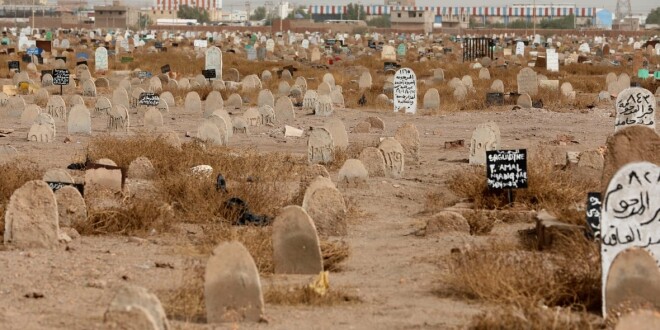(30 August 2021) As we mark the International day of the disappeared on 30 August 2021, Sudan is yet to account for hundreds of political dissents forcefully disappeared during al Bashir’s regime and during the 2018-2019 national revolution. Those missing during these periods also remain uncounted for. Under international law, the crime of enforced disappearance continues until the state reveals the fate or whereabouts of the individual concerned and this requires, when the disappeared person is found to be dead, returning the remains of the victims to their families.
Since the collapse of al Bashir’s regime in April 2019, several mass graves believed to contain remains of people forcefully disappeared, missing, extra- judicially killed or executed have been discovered across Sudan. The gravesites documented vary in size, with some holding several dozen bodies.
A recent report commissioned by the Sudanese General Prosecutor indicates that two mass graves were discovered in Khartoum in June and July 2020. They each contained 28 and 40 bodies respectively. One of the graves is believed to hold bodies of military officers who were allegedly engaged in a coup attempt against al Bashir in 1990 whilst the other contains remains of students reportedly killed at a national military camp in 1998. Three mass graves were earlier discovered in Central Darfur.
In November 2020, the committee on the missing persons announced that they had discovered another mass grave containing the remains of people considered “missing” after the 3 June massacre in Khartoum. The committee has since secured the site to ensure that it is not tampered with, and have taken the bodies to morgues for DNA testing and to ascertain the circumstance of death. The committee stated that evidence suggest that mass graves exist in specific areas of missing persons that were killed, and buried illegally.
A mass grave does not have an international definition but in a definition adopted by the Special Rapporteur of the Human Rights Council on extrajudicial, summary or arbitrary executions, it is a burial site where the “circumstances surrounding the death and/or the body-disposal method warrant an investigation as to their lawfulness. It suggests that remains were handled unlawfully, intended to obstruct not only repatriation to loved ones but formal justice too.
The Special Rapporteur on extrajudicial, summary or arbitrary executions notes in his report to Human Rights Council that a mass grave is an evidence of commission of grave human rights violation including failure to respect the right to life. It further conveys the failure of the state to protect the right to life. While the victim is denied the right to decent burial, families are also denied justice and the right to truth of what happened to their loved one.
African Centre for Justice and Peace Studies documented several human rights violations during the al Bashir era and during the 2018-2019 revolution that explains the current discoveries of mass graves, including mass killings and torture. The practice of enforced disappearances was also increasingly used by Sudanese national security forces and government-backed paramilitaries, purportedly to “preserve national security”. In one interview, a member of the committee on enforced disappearance stated that the committee had found that some bodies of the victims of the 3 June massacre had been buried before identification.
The large number of complaints from family members whose loved ones have been disappeared or have been missing heightens the urgency of exhuming the mass graves in Sudan. Sudanese authorities should give victims’ families the answers and the justice they deserve. The authorities, with the help of international forensics experts, should exhume the dead and reveal their identities. The international community should support the investigation, including by providing forensics experts to help conduct DNA testing.
Sudan has taken significant steps towards ending human rights violations by ratifying the Convention against Torture, International Convention for the Protection of all Persons from Enhanced Disappearance (ICPPED), and the Convention on the Elimination of All Forms of Discrimination Against Women (CEDAW). However, these treaties must be domesticated soon enough to ensure their full implementation.
A lack of accountability for past crimes has fostered a climate of impunity in Sudan .To date, several perpetrators of human rights violations have not been held accountable mainly among others due to the immunity laws that protect perpetrators and lack of political will. The National Security Act was amended in July 2020 to remove immunity granted to members of National Intelligence Security Services, now rebranded as the General Intelligence Services. The 2019 Constitutional Charter still grants immunity from prosecution to all members of the sovereign council.
In September 2019, the National Independent Committee to investigate the violations committed on 3 June 2019 was established. The committee was granted prosecutorial powers and three months to complete its mandate although this time limit has since been extended. The Attorney General has also established several investigation committees including an investigation committee to investigate members of the former regime. Other on-going investigations include cases on enforced disappearances, extra-judicial killings, torture and other serious violations. These independent committees should expedite investigations and share their long-awaited reports, and those responsible should be brought to justice.
Lastly, Sudan should take all necessary measures to locate, disclose, protect and preserve all mass graves sites. Hiding, damaging or destroying mass graves are strictly prohibited as it would constitute a violation of the right of families and society to know the truth about the circumstances behind the existence of the mass graves, including executions and enforced disappearances.
 African Centre for Justice and Peace Studies ACJPS | المركز الافريقي لدراسات العدالة و السلام
African Centre for Justice and Peace Studies ACJPS | المركز الافريقي لدراسات العدالة و السلام




